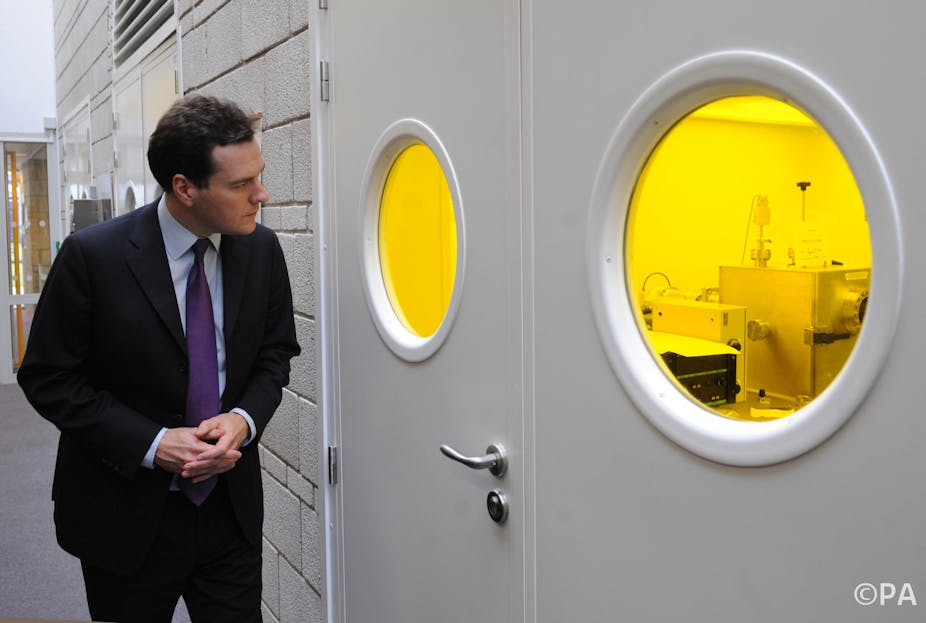Innovation policy in the UK has taken on a medieval cast. No sooner do we have Catapult Centres, than there is a call for Arrow Projects. This is the headline recommendation of a report to government by Sir Andrew Witty on the role of universities in driving economic growth.
The tip of the arrow, in Witty’s metaphor, is world-class research from leading universities – behind this tip we should mobilise research institutes and private sector partners to develop new technologies that would drive new economic growth, involving British companies, big and small, in new supply chains.
After a long period in which the industrial policy of successive British governments was not to have an industrial policy, we are once again seeing sector strategies being developed and some technologies being identified as priorities.
We see more prominence for the Technology Strategy Board, and the development of Catapult Centres as physical hubs for translational research, which helps transform scientific findings into practical use for people’s health. Graphene, cell technology, and quantum information technologies have been singled out as areas in which world-leading research supported by our research councils should be purposefully translated into new products and new businesses. New announcements in the budget of new Catapult Centres in two of these areas continue this direction.
The budget announcements have a high political profile, but they are small interventions against a big picture of continuing overall decline.
Decline in research
Last week saw a government response to the Witty report, which warmly welcomed its recommendations, while making few actual new commitments to support them. But last week also saw the publication of the latest set of national research and development statistics.
Total research and development expenditure – in the private sector, in government laboratories and in universities – has fallen in both cash and real terms. In proportion to the size of our economy, it is now substantially lower than both established economic rivals such as France, Germany, the USA and Japan and emerging economic powers such as Korea and China.
Our continuing economic problems, with stagnating productivity and a continuing inability to produce enough tradeable goods to pay our way in the world, suggest that we should worry about how effective our innovation system is for translating science into economic growth.
But this is hardly a new problem. Does the Witty Review represent the kind of radical new approach that might help us solve this persistent problem? Or are there more deep-seated issues that require a more fundamental rethink?
The “arrow” metaphor puts the role of basic research at the forefront. The Witty Review follows in a long tradition of UK science and innovation policy in assuming that translating strong basic research into economic growth is a matter of improving the connectivity between research and industry – particularly innovative small and medium-sized enterprises. It also encourages universities to make the most of their intellectual property through spin-outs, and ensures a continuous output of skilled people.
Demand side needs a boost
That is all worthwhile, but it is all about the supply side of the innovation system, and the message from last week’s research and development figures should be that this is not enough. Most of the UK’s research takes place in the private sector, which saw another 2% decline in 2012. In the sector in which Sir Andrew Witty’s own company, GSK, operates – pharmaceuticals – research and development fell by 15%.
The relative decline in business research and development in the UK is a long-term phenomenon. It began in the 1980s. It is a phenomenon that is unique to the UK.
Research and development is not the only source of private sector innovation, but it is important as a measure of the degree to which business is organising itself to create valuable new products and processes through technological innovation. The decline in private sector research intensity in the UK is a signal that the problems with our innovation system cannot solely be addressed by supply-side measures: the problem is on the demand side.
The origins of the UK’s declining capacity to deliver commercially valuable technological innovation are deep-rooted, and have been analysed in more depth in my own paper “The UK’s innovation deficit and how to repair it”. The causes include an economy marred by persistent short-termism, an over-reliance on the financial sector, and an emphasis on deal-making rather than business building.
There are some welcome signs that some of these problems are being recognised in government, and if the response to the Witty Review doesn’t commit to very much new, it does underline positive signs in the way thinking is evolving in government.
The issue that faces us now is whether the scale of the remedies matches the scale of our problems, or indeed the scale of the opportunities that new technologies could offer. Our chronic and continuing underperformance in research and development – particularly at the strategic and business supported end – suggests that they don’t.

